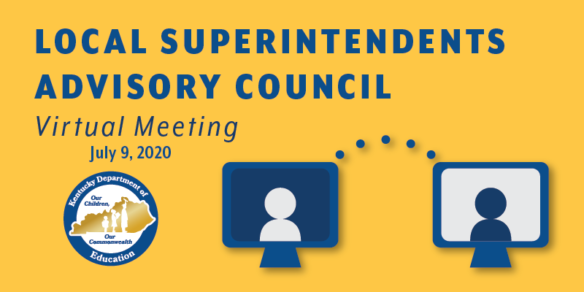
- Amendments will allow several ways to count attendance based upon student participation, let districts use prior-year student numbers to figure funding.
- More flexibility likely in other areas as situation changes, KDE officials say.
By Jim Gaines
jim.gaines@education.ky.gov
At its June 9 meeting, the Local Superintendents’ Advisory Council (LSAC) unanimously approved amendments to two regulations aimed at giving districts flexibility in measuring student attendance and decoupling Support Education Excellence in Kentucky (SEEK) funding from attendance numbers for the 2020-2021 school year.
Both amendments will come before the Kentucky Board of Education (KBE) at a special meeting on July 10.
The attendance amendment, temporarily changing 702 KAR 7:125E, will let schools move as needed between in-person teaching and remote learning. It would even let some students learn from home while others attend school, said Kentucky Department of Education (KDE) Interim Commissioner of Education Kevin C. Brown.
“It does not provide an incentive or a disincentive for you to do that,” he said.
Current law on funding only covers situations in which every student is at school, or in which school buildings are closed and every student is learning remotely, said KDE Interim General Counsel Todd Allen. Normally, schools are limited to just 10 days of non-traditional instruction (NTI) each year.
When schools were allowed to use unlimited NTI in spring 2020 due to COVID-19, districts around the state reported weekly student participation above 90% – close to normal, said David Cook, division director in KDE’s Office of Continuous Improvement and Support.
Previous emergency memoranda and Senate Bill 177 (2020) decoupled current attendance from SEEK funding, Allen said. Districts were allowed to use either their 2018-2019 or 2019-2020 attendance records for calculating SEEK funding.
The proposed amendment to 702 KAR 3:270E extends those provisions through the upcoming school year, he said. They would go into effect immediately upon approval by the KBE and filing with the Legislative Research Commission, Allen said.
The extension will let school districts better predict what state funding they’ll get, Brown said. Last school year, 14 districts opted to use 2019-2020 attendance data to calculate funding for the upcoming year, while the other 157 districts in Kentucky fell back on their 2018-2019 data, said KDE Associate Commissioner Robin Kinney.
Cook said the amendment lays out four options to record daily student participation for learning through non-traditional instruction: through a video chat or phone call, in a group chat, by noting time spent on learning management systems, or through submission of work on paper. Participation for in-person students will be their presence at school.
Kinney said districts can report that data through Infinite Campus. More information will be posted on the KDE website and KDE staff will help districts comply, she said.
Policies will be tweaked further as fall unfolds, Kinney said.
Waivers of other rules are likely as new issues crop up, Brown said.
MORE INFO …
- LSAC Meeting: June 9, 2020
- Kentucky Department for Public Health’s COVID-19 webpage
- KDE’s COVID-19 webpage
- COVID-19 Hotline (800) 722-5725



Leave A Comment